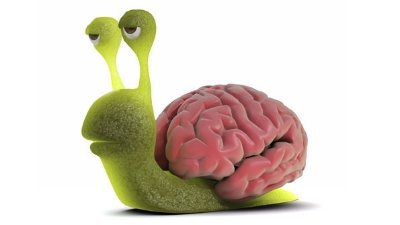Your Brain is Lazy (Why It Can Feel Hard to Stick to Goals)
How many times have you made a goal to improve yourself and failed to follow through? Honestly, it’s probably thousands of times. For all of us! I’m counting all the Big Goals (I’m going to work out 6 days a week for an hour) and the little goals (I’m just going to watch one episode on Netflix before bed). So why is there such a discrepancy between the awesome life plans we’ve designed and actually taking the actions that will get us there?
Basically, our brains are fucking lazy.
Here’s the scoop: there are essentially two systems of thinking (described by Daniel Kahneman in his book Thinking Fast and Slow):
• System 1: Fast, automatic, frequent, emotional, stereotypic, subconscious
• System 2: Slow, effortful, infrequent, logical, calculating, conscious
Let’s start with the second type - slow thinking. Slow thinking happens in your pre-frontal cortex (PFC), the most evolved part of your brain. This is the part of your brain that makes you human. The part that can think about thinking, make predictions, control impulses, solve problems, and create new ideas. It’s the part of you that looks at your life and your potential, and plans a way for you to become your best self, living a bomb-ass life that makes you proud.
Fast thinking, on the other hand, comes from the subconscious mind, which lives (for our purposes today) in the limbic system. This is the second least evolved part of your brain. It’s the part that receives external stimulus (rustling sounds in the woods at night), processes that info immediately based on your past experiences, established habits, and feelings (I’m pretty sure that’s a bear), stimulates a chemical/hormonal response (cue adrenalin and cortisol), which leads to an instant, emotional directive (BITCH, RUN!). It’s also the part that really prefers it if everything feels good all the time, thank you very much, so let's avoid anything uncomfortable, ok?
These two systems of thinking go a long way towards explaining why it's so challenging to put your plan into action. Put simply, your brain prefers and prioritizes efficiency (fast thinking), and doing new stuff is hard (slow thinking). New thinking requires ignoring your hardwiring - otherwise known as the automatic processes, habits, thoughts, and feelings that you’re already super good at because you’ve done them a thousand times before - and consciously choosing something different.
As far as your brain is concerned, when you ask it to PAY ATTENTION and THINK DIFFERENTLY and BUILD NEW HABITS, you may as well be saying, “Hey - you know that really easy, well-paved, super wide road you’ve been taking to work everyday? The one that you can drive with your eyes closed, because you know all the twists and turns and stoplights? Well, today I’d like you to walk to work on this totally indirect, tiny, overgrown deer trail instead. Also, it’s raining. I’m fresh out of umbrellas, but I’m sure you’ll manage. Have fun!”
As you can imagine, your brain (being lazy), is most likely to pause briefly and land on, “fuck you,” before driving to work the same way it did yesterday. It’s comfortable and familiar. And because our brains are wired to seek the shortest distance to reward, comfort and familiarity equal an immediate hit of dopamine, the “feel good” chemical our brains naturally produce.
So essentially starting a new habit is consciously choosing withdrawal from our very favorite, self-producing drug. Great.
Let’s play with a real life example almost everyone is familiar with. Say your best life includes a fit, healthy you that’s 30 lbs lighter. Your PFC looks at where you are now, where you want to be, and plans the changes you need to make to your fitness and nutrition habits to bring this goal to life. This is a killer plan, and you feel like Superwoman. Time to launch:
Step 1: Bring lunch to work instead of ordering Seamless to your desk
Step 2: Go to the gym after work every day
Step 3: Cut out sugar and alcohol
Great plan, right? Makes tons of sense. Totally takes into account the various obstacles between you and beach body.
And then you try to actually DO IT.
NEW YEAR, NEW ME: A PLAY IN THREE ACTS
ACT 1
PFC: “You should totally pack a lunch for work tomorrow. It will be healthy and you’ll feel good about it.”
Subconscious, Immediate Brain: “That sounds like a pain in the ass I haven’t had to deal with before, and I’m sooooo tired. The idea of going to bed right now instead of making lunch for tomorrow makes me happy, so I’m going to give you some dopamine to get you on a happy high. Sweet dreams!”
……..
ACT 2
PFC: “Work’s done, so it’s time to go to the gym!”
Subconscious, Immediate Brain: “This is bullshit. I’ve had a long-ass day, and going to the gym sounds way harder than going home and eating mac & cheese. Plus mac & cheese tastes really good, and I deserve it because I had a long-ass day. Fuck the gym. Let’s go get some dopamine.”
……..
ACT 3
PFC: “You can totally go to a birthday dinner with your three best friends without drinking anything or eating birthday cake.”
Subconscious, Immediate Brain: “OMG I LOVE YOU GUYS SO MUCH LET’S CELEBRAAAAATTTTEEEE. It’s only one night of bad behavior anyway. YAAAAAAAAAAY! SHOTS (of dopamine and endorphins) FOR EVERYONE!”
FIN
_________________________________________________________________
Starting to look uncomfortably familiar, am I right? Don’t freak out.
Here’s the good news:
The fact that you’re having trouble staying on track with your goals doesn’t necessarily mean you have a lack of willpower. It means your brain is wired exactly like everyone else’s is, and now that you know that, you have the power to do something about it.
All it takes to create new hardwiring (i.e. to build a new habit that your brain will reward you for) is ATTENTION and REPETITION. Seriously. That’s it.
You don't have to say goodbye to happy brain chemicals either. In fact, studies have shown that simply starting to work on the activities related to your goal activates the pleasure center of your brain. Basically, you think to yourself, "Hey - look at me ALL ADULTING AND STUFF. What WHAT." And BAM: dopamine.
So here’s the new plan:
(pay special attention to steps 4-6)
Decide what you want to change in your life.
I’m going to get fit this year.
Decide what it’s going to take to get you there. What new habit do you need to build?
I’m going to go to the gym after work three days per week.
Plan to take the actions you defined in Step 2.
I’m going to pack my gym bag and schedule gym time on M, T, R this week.
(Here’s the kicker!) PLAN FOR YOUR BRAIN FUCKING WITH YOU when you actually try and implement the action.
Here’s what I’m going to say when my brain tries to convince me to go home, “Hey brain - I’m onto you. I’ve already used the most human, evolved part of me to decide how to get the life I want, and it doesn’t involve mac & cheese. So get on board, because we’re DOING THIS.”
Think through and list all the awesome ways your life is going to change when you accomplish this goal.
I’ll feel better. I’ll look better. I’ll be stronger. More fashion-y stuff will fit me. I’ll be more confident. Because I’m more confident, I’ll do better at work. Maybe I’ll even get a raise. Shit, I’m a baller at this point so why wouldn’t I find my dream guy/girl? Obviously, I will. Also, I should probably be able to run just in case there’s a zombie apocalypse.
Implement plan + move through your brain's hardwired response + remember the awesome incentives you listed in Step 5.
Go to gym after work.
Repeat until it’s a habit.
Now you’re fit & fabulous. Good job!






